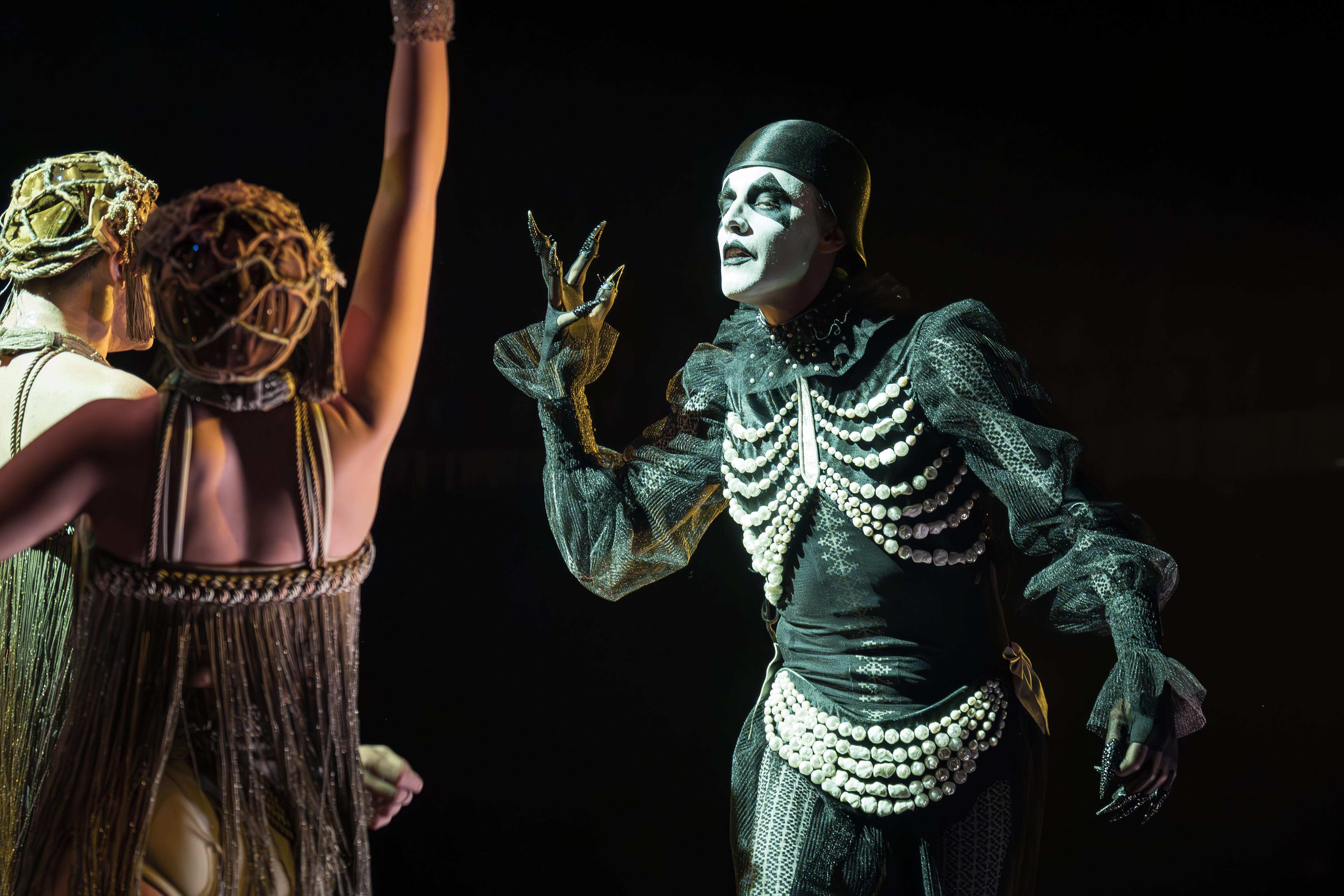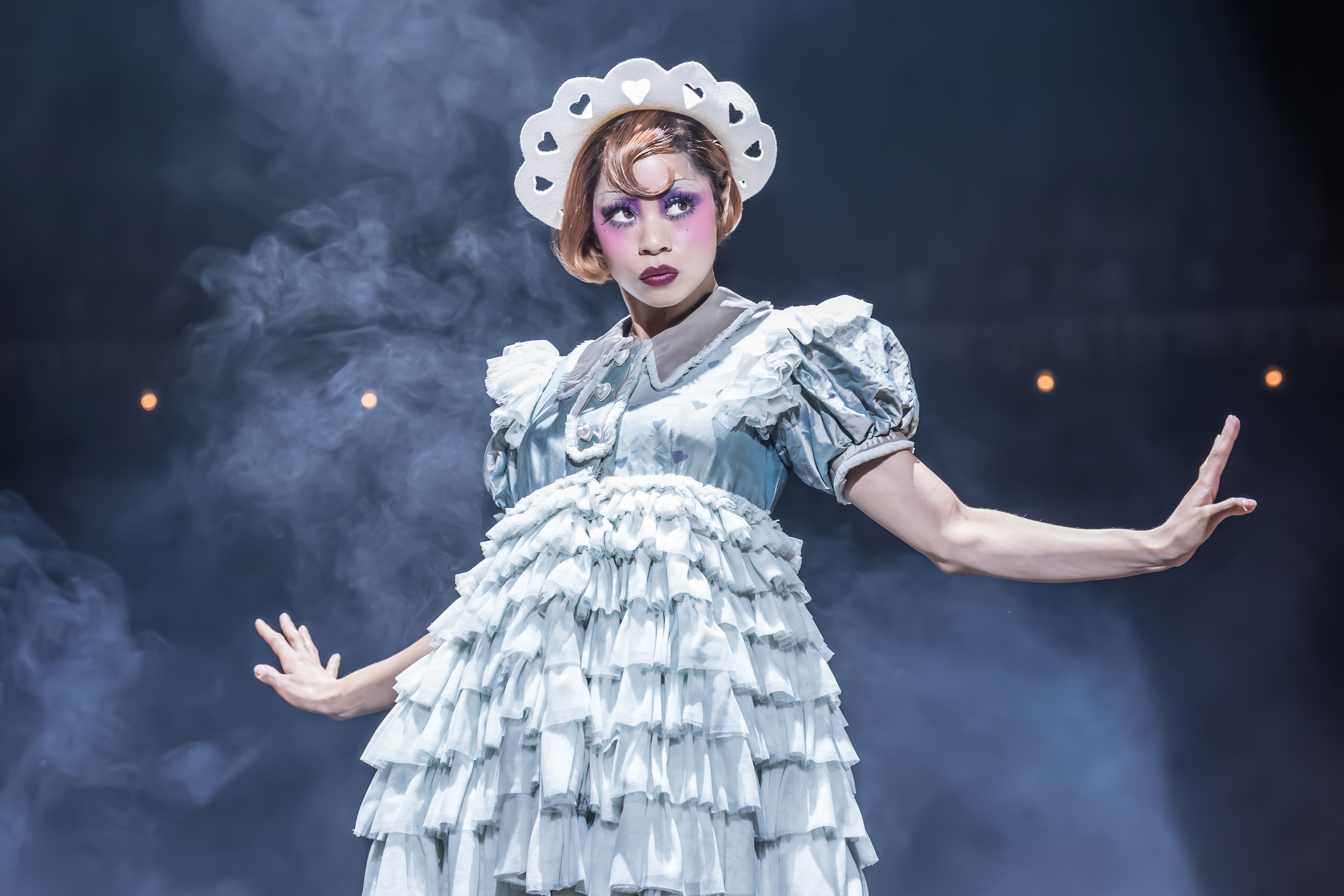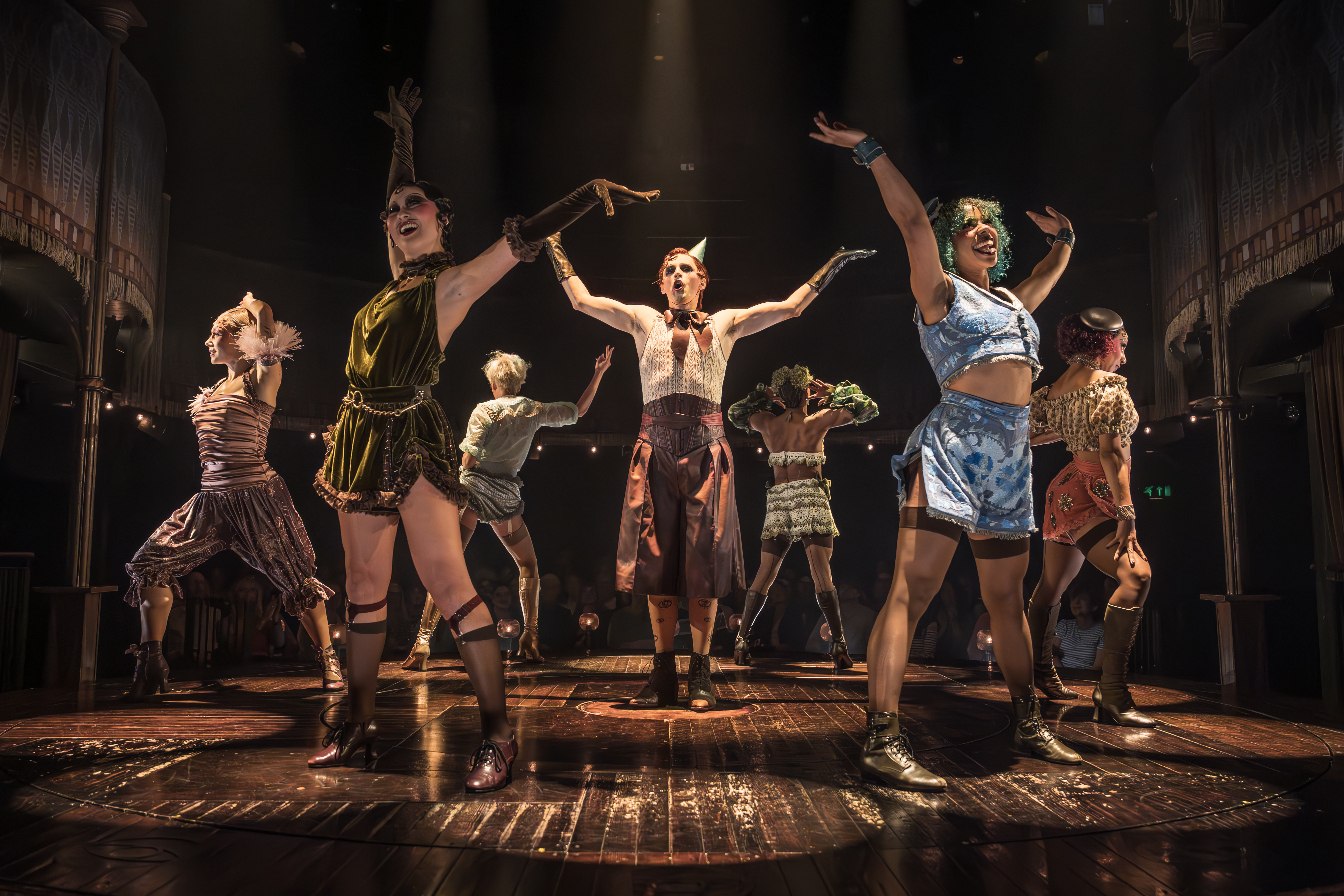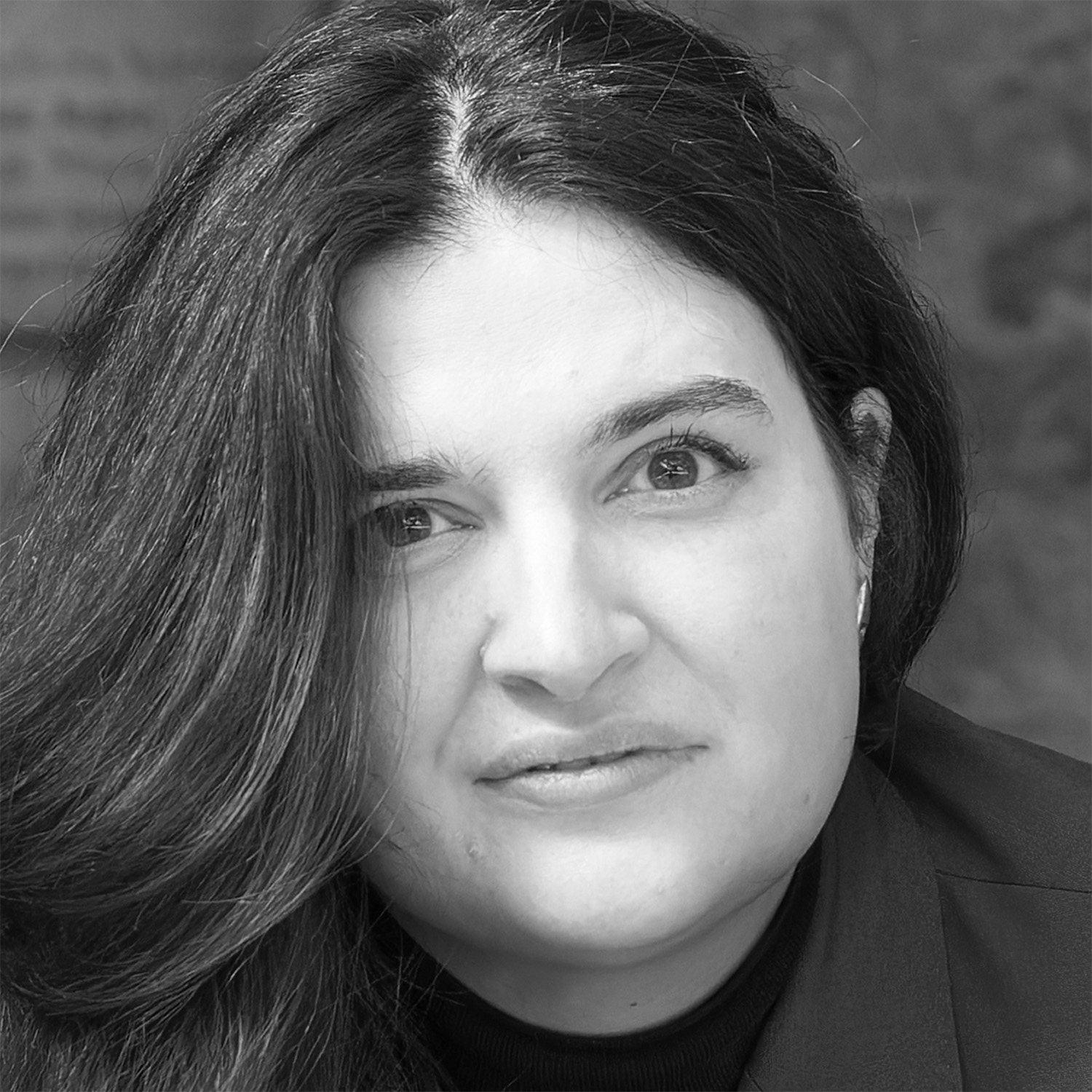This July, the producers of West End musical Cabaret threw a party. Champagne flowed like a subterranean river through the bars of London’s Playhouse theatre, extravagantly remodelled in 2021 to become the Kit Kat Club. As the lights rose on a gala performance of John Kander’s 1966 musical, Janet Jackson sashayed into the most prominent box in the house. With 1,500 performances, Rebecca Frecknall’s production had become the longest Cabaret ever to run in the West End.
Cabaret is based on the 1939 Christopher Isherwood novel Goodbye To Berlin, inspired by his time in Nazi Germany. “I am a camera with its shutter open, quite passive, recording, not thinking,” reads its opening line, although the flashbulbs of the paparazzi outside the Playhouse were less discreet. Kander’s musical is a depiction of a hard-partying urban class wilfully blinding itself to the rise of fascism. Sally Bowles, the musical’s showgirl protagonist, badgers her roommate Cliff to buy champagne rather than pay the rent.
If our gala hosts felt any irony, it wasn’t visible. But there were other unhappy undercurrents. A month earlier, producers had announced that the New York run would close, 18 months after the New York Times critic Jesse Green compared the production’s aesthetic to the alcoholic shots served on site, which tasted “like cough syrup cut with paint thinner”. The full scale of this drama has just begun to emerge. Last week, an investor, James Walker, filed a lawsuit against several of the show’s producers. Legal documents revealed the producers had promised to “cap” production costs at $26m (£18.6m) – an eye-wateringly high limit by most standards, invested in the hope of putting on a show that would run for years.
Walker accuses producers of “concealing” some revenue and diverting profits into “undisclosed, self-interested transactions”. These claims are strongly denied: ATG Entertainment, the parent company of lead producers ATG Productions, told The Stage newspaper that Walker’s lawsuit “lacks any merit” and blamed the market for the fact “the production has not been in a position fiscally to make any distribution to investors”. Box office figures tell their own story: ticket sales peaked at more than $2m (£1.5m) in May 2024 when Oscar winner Eddie Redmayne led the cast; this September they fell to $380,000 (£283,000), exacerbated by its current lead Billy Porter pulling out over ill-health. That aside, the Broadway team failed to sell their Cabaret as anything more than a Redmayne show.
In London, however, Cabaret has been a one-in-a-generation theatrical success, transforming the West End. On 22 September, its 13th cast took over the lead roles, with little loss of audience appetite. Over half a million people have seen a performance since 2021, many of them choosing to dress in costume. For those buying “premium” packages, with dinner and (more) champagne, the show offers a one-off luxury experience. The team argue that the show is bringing new audiences to the West End: last year, 36.4% of Cabaret ticket buyers had never bought a ticket for any other Ambassador Theatre Group venue. They’re loyal too: the percentage of repeat bookings is three times higher than ATG’s West End average.
What’s less clear is how many of these newcomers adopt a regular practice of theatregoing – or have any change left from Cabaret to so. When the show opened in December 2021, starring Redmayne and Jessie Buckley, premium tickets were priced at £325, resetting the trend for the post-Covid West End. In a viral tweet, the playwright Dan Rebellato described the prices as “absolutely disgraceful and immoral”. (The ATG producer Adam Speers points out that the cheapest tickets have always been £30 or £40 and that the in-the-round remodelling of the Playhouse ensures “democratic” views.)

‘The Emcee becomes a skeleton, with bones strung like pearls’: Reeve Carney stars in the new London cast
But the fuss was soon drowned out by the adulation of critics. “Wow… Again, just wow”, wrote the Evening Standard’s Nick Curtis, although the Observer’s Susannah Clapp was more cautious, noting that: “At times the splendour of the show detracts from its tawdry danger.” The show won a record seven Olivier awards.
Why was such success not replicated in New York, where a progressive show with a three-figure price tag is a cultural norm? “Not a day goes by where I don’t ask myself that question”, Speers admits. The official line is that Broadway audiences had their fill of Cabaret with Sam Mendes’s production, which ran for 2,377 performances between 1998 and 2004, and returned in 2014. More discontented voices blame the creative sidelining of the show’s first producers – Underbelly, best known for their work on the Edinburgh fringe – in favour of Broadway money-men with big marketing budgets. They point to the time spent at Vogue photoshoots instead of in the rehearsal room. Underbelly are the only major producers not listed for court summons in Walker’s lawsuit.
The other answer is that Frecknall’s production made a series of strong choices loved in London and hated in New York. When I speak to her over Zoom, she is thoughtful, observant and generous. Together with her long-term collaborator, the designer Tom Scutt, Frecknall viewed Cabaret as a story about resisting conformity – “we loved the idea of going on a journey from colour to a point of monochrome, with the colour draining out of the show” – and a sexual club-world which resembles contemporary spaces of trans and queer self-discovery rather than one offering punters commodified gratification.
Notably, Frecknall seems to see Sally’s decision to stay in Berlin, even as Nazism descends, as an act of resistance rather than complicity. In the show’s controversial finale, Sally sings the title number in a paroxysm of rage and defiance while wearing the monochrome men’s suit that has become the show’s fascist uniform. For some it was too abrasive. When Gayle Rankin took on the role on Broadway, Jesse Green complained in his review: “If Rankin doesn’t sound good in the number… she’s not trying to. [Her voice is] meant to be taken medicinally and poisonously in this production, projecting instead of concealing Sally’s turmoil.”
Newsletters
Choose the newsletters you want to receive
View more
For information about how The Observer protects your data, read our Privacy Policy
For Frecknall, the song is a moment of triumph: “What she’s saying is ‘it’s on my terms now’. I always really loved that we felt like it was a war cry.” Cliff, an American, returns home instead. Other productions have depicted this as a choice that reflects his maturity, but Frecknall prefers Sally’s approach. “She might die there, but it's her choice, and she’s going to go down in truth of who she is – whereas he might live a long life, but he will never be free. I always found that to be his tragedy.”
It’s a shift that depends on framing Cliff not as the straight-passing sexual tourist of some versions, but as an incontrovertibly queer man, whose offer to be a father to Sally’s child is a ploy for respectability, rather than an act of personal responsibility. It also inverts the traditional lesson of Cabaret that any of the characters with half a chance – including the Jewish character Herr Schultz – should have fled Nazi Germany. Perhaps this is a challenging interpretation for New Yorkers today. But there’s no denying it made this Cabaret radical.
When the show opened in London, it carried the weight of the West End on its shoulders. Covid-19 had devastated the UK theatre sector: the Society of London Theatre and UK Theatre reported member venues lost a total of £630m in income after a 12-week closure in 2020. By winter 2021, theatres had reopened in a series of fits and starts: Cabaret’s previews coincided with the emergence of the Omicron variant, which threatened to send London back into lockdown. “That pressure to ‘bring the West End back’ slightly bypassed me, because all the way through it, I didn’t really believe we were going to open,” Frecknall tells me.

‘She’s in this very masculine world dressed up as this baby doll’: Eva Noblezada as Sally Bowles
Redmayne was always central to the project: he had first played the role of the Emcee – a shapeshifting nightclub ringmaster who functions as a totemic figure for emergent Nazism – as a school-leaver at the Edinburgh Fringe. That production was staged at Underbelly, then in its second year at the fringe. Its co-founder Ed Bartlam had long encouraged Redmayne to return to the role. But they needed a venue that could replicate the demimonde vibe of both the Edinburgh fringe and Isherwood’s Berlin. They started by looking for “found spaces”, abandoned buildings that could be reclaimed.
Instead, Speers and ATG suggested that their Playhouse theatre by London’s Embankment station could be turned into a nightclub. The result was an in-the-round space that demanded a transformation of Kander’s musical, originally written for a proscenium arch. “There’s a farce scene involving sailors running in and out of bedroom doors that had to be completely reimagined for circular entrances,” Frecknall recalls. ATG also introduced their premium pricing models.
Yet for all its luxury, the 360-degree staging keeps this Cabaret stark and intimate. When I speak to Scutt, he points out that any fixed scenery would have blocked someone’s view. He turned instead to “the sculpture of the body” for visual structure. The search for strong shapes is reflected in Julia Cheng’s architectural choreography, as well as the grotesque, bejewelled costumes with which Scutt filled his underworld. The Emcee becomes a skeleton, with bones strung like pearls; Sally sings her early number Don’t Tell Mummy in an oversized baby-doll dress with an exaggerated silhouette.
Frecknall, the first woman to direct a major production of Cabaret, took pleasure in adding Dr Martens boots to the look: “She’s in this very masculine world dressed up as this baby doll, but she’s also got these punk boots on that she could kick your teeth in with.” Scutt and Frecknall talk about rejecting the hats and suspenders of Bob Fosse’s 1972 film. “We were very concerned about the male gaze in the creation of the outfits,” says Scutt.
Reclaimed or not, Sally’s stage act relies on what Frecknall calls “the fetishisation of youth and virginity”. In the most recent lineup, this was given an added piquancy by the casting of Hannah Dodd, straight from her role as a deeply aristocratic English virgin in Bridgerton. Dodd spoke with the same cut-glass accent she’d brought to Regency debutante Francesca Bridgerton, but her blushes were knowing, not modest.
Eva Noblezada has now taken over the role in London, alongside Reeve Carney as the Emcee. The 13th cast of a production that seems to have no end in sight. This Cabaret will keep playing until the champagne runs out.
Photographs by Marc Brenner

